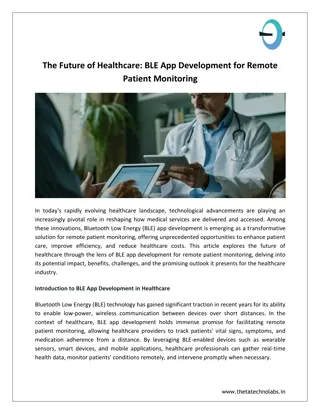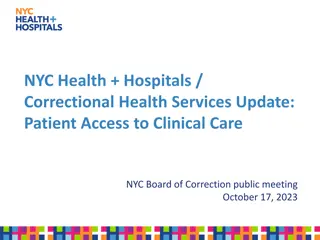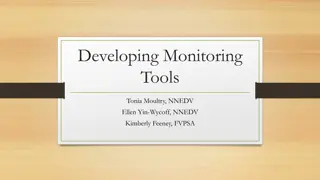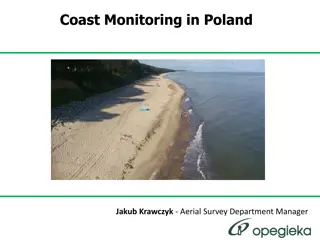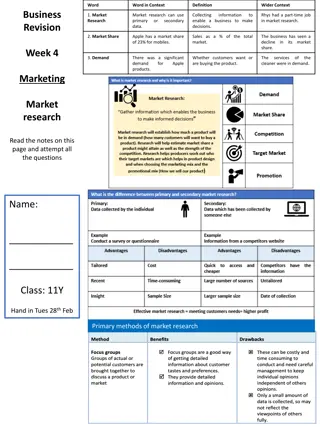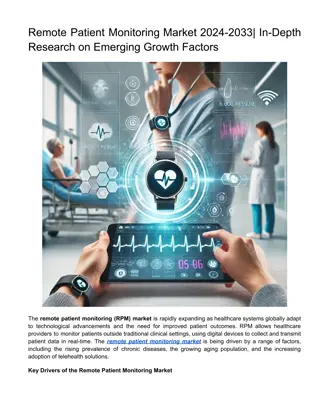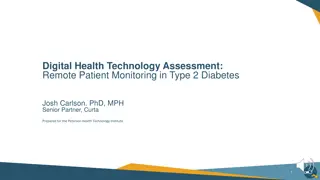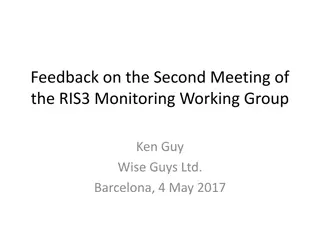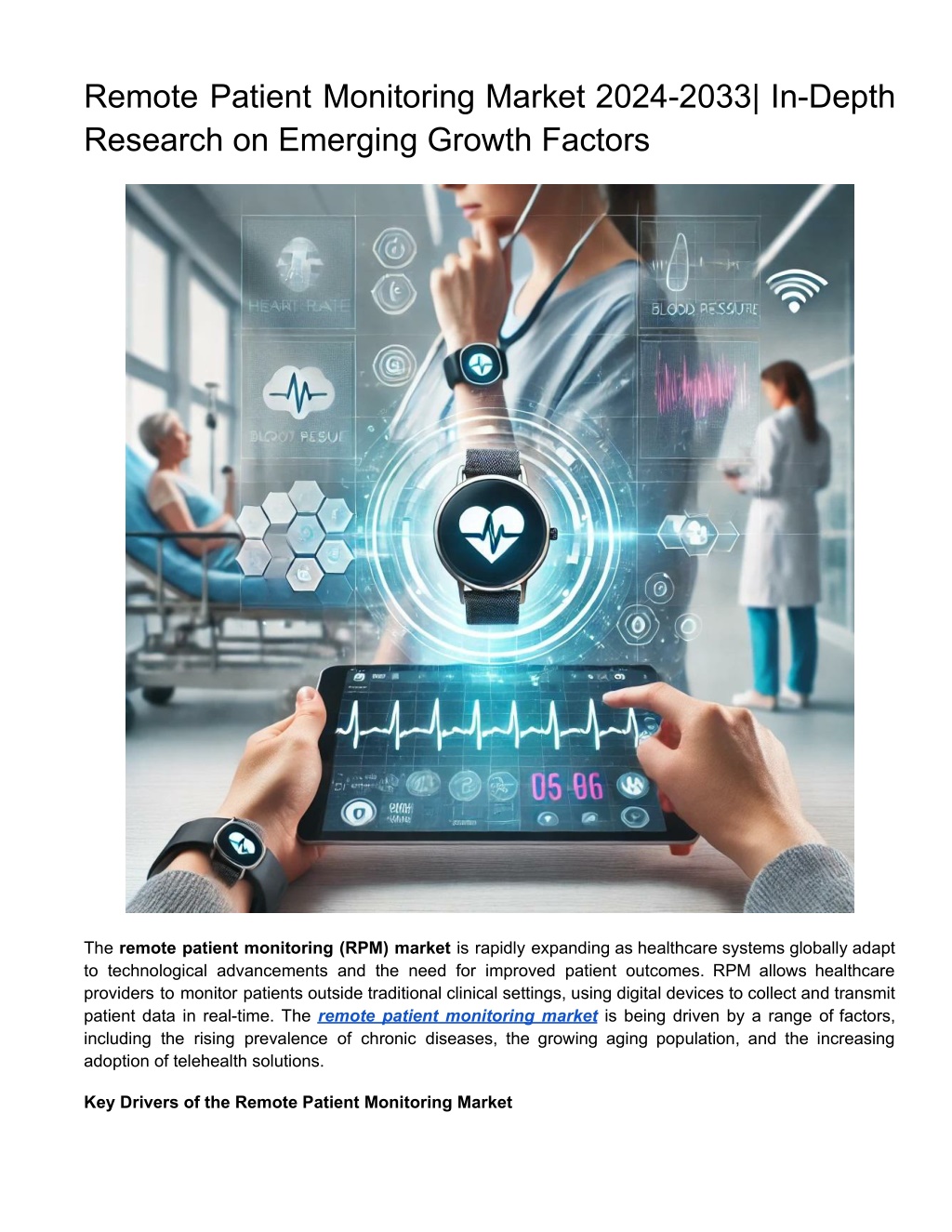
Remote Patient Monitoring Market 2024-2033 | In-Depth Research
The remote patient monitoring market is being driven by a range of factors, including the rising prevalence of chronic diseases, the growing aging population, and the increasing adoption of telehealth solutions.nnRead Report Overview: //bisresear
Download Presentation

Please find below an Image/Link to download the presentation.
The content on the website is provided AS IS for your information and personal use only. It may not be sold, licensed, or shared on other websites without obtaining consent from the author. Download presentation by click this link. If you encounter any issues during the download, it is possible that the publisher has removed the file from their server.
E N D
Presentation Transcript
Remote Patient Monitoring Market 2024-2033| In-Depth Research on Emerging Growth Factors The remote patient monitoring (RPM) market is rapidly expanding as healthcare systems globally adapt to technological advancements and the need for improved patient outcomes. RPM allows healthcare providers to monitor patients outside traditional clinical settings, using digital devices to collect and transmit patient data in real-time. The remote patient monitoring market is being driven by a range of factors, including the rising prevalence of chronic diseases, the growing aging population, and the increasing adoption of telehealth solutions. Key Drivers of the Remote Patient Monitoring Market
1. Rising Prevalence of Chronic Diseases: Chronic conditions such as diabetes, cardiovascular diseases, and respiratory illnesses require continuous monitoring to prevent complications. RPM devices enable regular tracking of key health metrics like blood glucose levels, heart rate, and oxygen saturation, making it easier for healthcare providers to manage these conditions remotely. 2. Aging Population: The aging population is a significant driver of the remote patient monitoring industry. As people age, they are more likely to suffer from multiple chronic conditions that necessitate constant monitoring. RPM devices offer a convenient and non-invasive way to manage elderly patients' health, reducing the need for frequent hospital visits. 3. Technological Advancements: The integration of artificial intelligence (AI), Internet of Things (IoT), and data analytics has revolutionized the RPM market. These technologies enable more accurate and real-time monitoring, providing healthcare professionals with insights that can lead to timely interventions. 4. Telehealth Integration: The growing adoption of telehealth services, accelerated by the COVID-19 pandemic, has further propelled the demand for RPM solutions. Remote monitoring allows for continuous care in conjunction with telemedicine, creating a seamless patient experience and improving overall health outcomes. Remote Patient Monitoring Market by Application Oncology Cardiovascular Disease Diabetes Sleep Disorders Weight Management and Fitness Monitoring Request A Free Detailed Sample on Remote Patient Monitoring Market! Key Trends in the Remote Patient Monitoring Market 1. Increased Use of Wearable Devices: Wearable health technologies, such as smartwatches and fitness trackers, are becoming vital tools in the remote patient monitoring industry. These devices provide real-time health data that can be monitored remotely, enabling continuous tracking of vital signs like heart rate, blood pressure, and activity levels. 2. Integration of Artificial Intelligence and Data Analytics: AI and data analytics are being increasingly integrated into RPM platforms, enhancing the ability to analyze patient data, predict health risks, and provide personalized care. This technology allows for early detection of potential health issues, improving intervention times. 3. Telemedicine and RPM Convergence: The convergence of telemedicine and RPM is a growing trend, enabling healthcare providers to access real-time data during virtual consultations. This synergy improves patient monitoring and care management without the need for frequent in-person visits. 4. Shift Toward Home Health Monitoring: As healthcare increasingly shifts toward home-based care, RPM technologies are enabling patients to manage their health conditions remotely. This trend is particularly important for chronic disease management and elderly care, helping reduce hospital visits while maintaining quality care. Some of the prominent names established in this market are:
GE Healthcare Abbott Laboratories Siemens Healthineers AG Medtronic Teladoc Health Inc. Future Outlook The remote patient monitoring industry is poised for substantial growth in the coming years, with market analysts predicting a compound annual growth rate (CAGR) in double digits. Factors such as the increasing prevalence of chronic diseases, advancements in wearable technology, and the growing acceptance of telehealth will continue to drive market expansion. Additionally, government initiatives promoting digital health and the increasing focus on value-based care will further accelerate the adoption of RPM solutions. Conclusion The remote patient monitoring market is evolving rapidly, driven by technological innovations and a shift toward patient-centered care. As healthcare systems embrace RPM to manage chronic diseases, improve patient outcomes, and reduce healthcare costs, the market is expected to witness significant growth, creating numerous opportunities for healthcare providers and technology companies alike. Download Our ToC: Click Here! Key Questions Answered in this Report: What are the focus areas of the global remote patient monitoring market in the upcoming years? What is the value of revenue generated from the remote patient monitoring market across the globe and at what rate is the demand expected to grow during the forecast period? Which product(s) is poised to be the primary revenue generator in the global remote patient monitoring market? Among remote patient monitoring segments, which is projected to capture the largest market share? In terms of applications, which segment is forecasted to experience the highest Compound Annual Growth Rate (CAGR) during the forecast period? Which end-user segment accounted for the largest share of the remote patient monitoring market? What are the key growth factors of this market? What are the major opportunities for existing market players and new entrants in the global remote patient monitoring market? What are the major challenges faced by the existing players in the market? Who are the major players dominating in the global remote patient monitoring market space? Which regions/countries are expected to offer significant growth opportunities for the vendors operating in the remote patient monitoring market for the forecast period?



